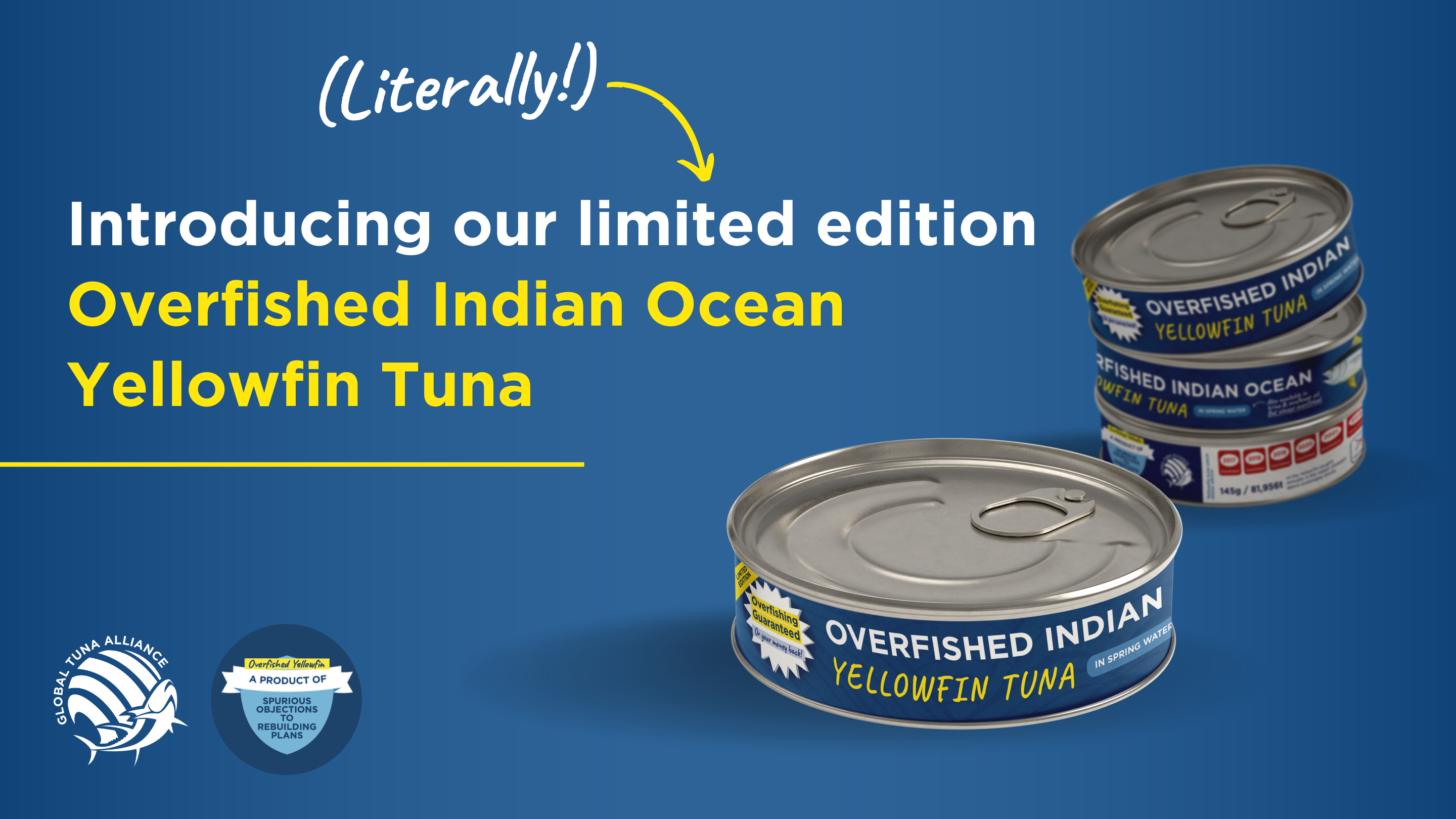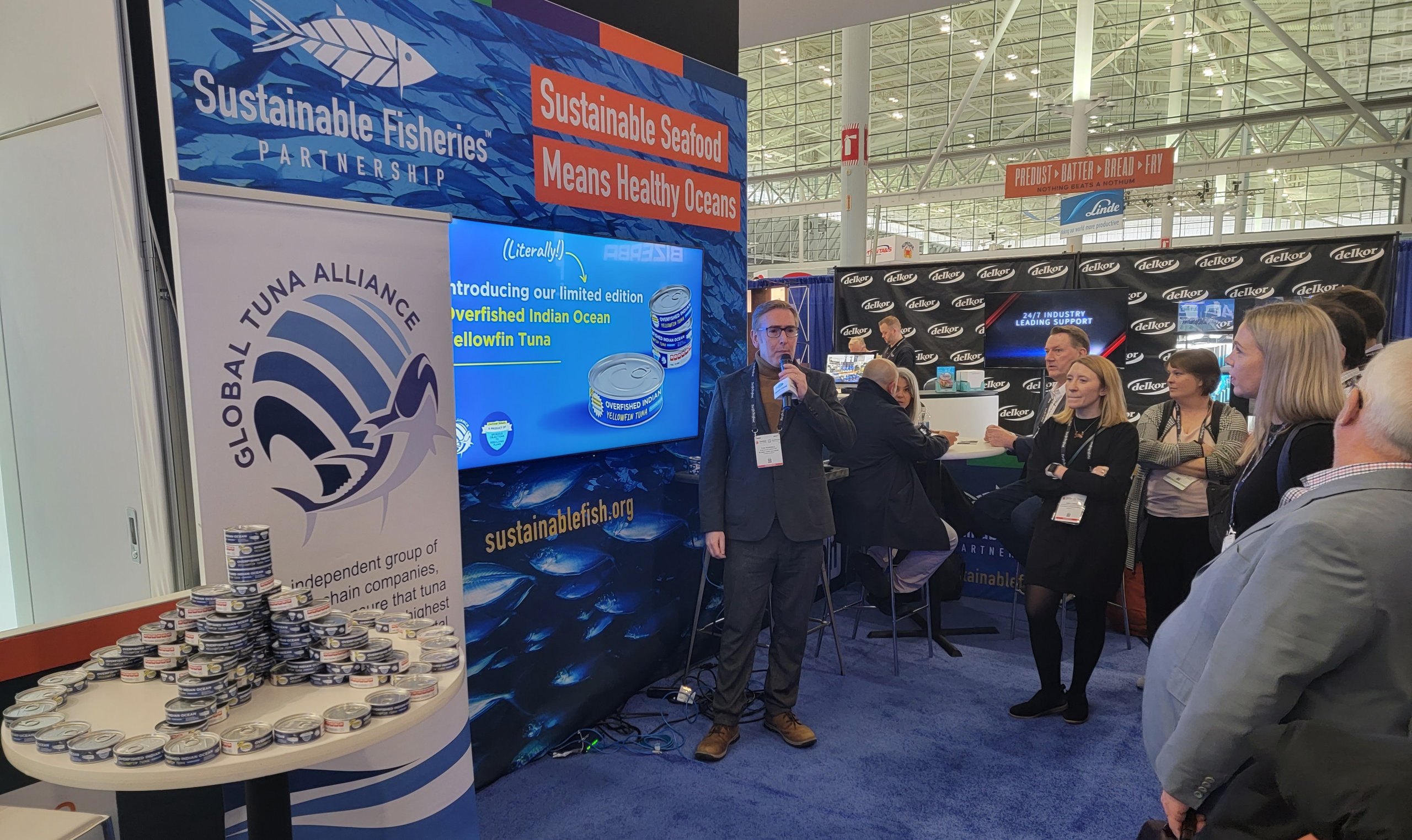
Since being formed in 2019, rebuilding overfished Indian Ocean yellowfin tuna has been a priority for the Global Tuna Alliance (GTA), a pre-competitive collaboration of 50 businesses with the shared goal of improving tuna sustainability. The latest stock status estimates from 2021 confirm that Indian Ocean yellowfin tuna remains overfished with overfishing occurring; and is more pessimistic than the previous assessment. To draw attention to the continued mismanagement of this important stock by the Indian Ocean Tuna Commission (IOTC), the GTA has today launched a new canned “product” – overfished Indian Ocean yellowfin tuna – at Seafood Expo North America.
In 2021 the Indian Ocean Tuna Commission agreed an interim rebuilding plan that set a total catch limit of 401,011t; just below the maximum level recommended at the time by IOTC’s own scientific committee.
This hard-fought agreement was the result of protracted negotiations and a patchwork of concessions. Despite this effort, the measure was only intended to apply in 2022; a new plan would be needed from 2023.
Even with the negotiated concessions, and the interim nature of the measure, six countries formally objected, creating further uncertainty throughout 2022. The first thing to note is the absurdity of a situation whereby countries can choose to ‘opt out’ of management measures. This undermines the ability of the Regional Fisheries Management Organisation (RFMO) to deliver on its mandate and penalises the ‘good actors’. Even though a majority of 24 IOTC member nations committed to protecting the yellowfin tuna stock, their efforts were undermined by the remaining six nations’ refusal to make any concessions.
A new stock assessment was published in October 2021 and the Maximum Sustainable Yield (MSY) estimate (the maximum amount that can be fished while keeping stock levels stable) for the Indian Ocean yellowfin stock was recalculated down to 349,000t; 51,000t below the interim rebuilding plan – the scientific advice noted that catches need to be further significantly reduced.
The Global Tuna Alliance wants to see the Indian Ocean’s yellowfin population rebuilt within two generations (approximately 10 years). To do this, the GTA is insisting that catch levels be reduced by 30% compared to the 2020 catch, which according to a report by the IOTC scientific committee, would yield a 67% chance of rebuilding the stock by 2030. This equates to a yellowfin catch below 302,837t. The GTA believes all nations and gear-types are now required to play their part to achieve this target, irrespective of areas of operation or vessel size.
The IOTC meeting in 2022 was an opportunity to set new catch limits in line with scientific advice. However, to achieve this, all countries needed to play their part for the greater good of long-term stock health.
Despite scientists, consumers, NGOs and retailers all calling for a catch reduction on yellowfin, a recurring theme in the IOTC meeting was certain delegations objecting to proposals without offering alternatives or a rationale. Those who did explain their reasons frequently cited that they were supportive of conservation measures – proving that they understand the importance of reducing catch – though they weren’t prepared to cut their own share. Of course, many member states did agree to take considerable cuts, and were frustrated with the lack of compromise from others.
In 2023, consumers choose to purchase their seafood from sustainable sources, and the market is looking for progress to be made. With an estimated 30% of global tuna passing through GTA Partners, they have undeniable purchasing power as well as multiple sourcing options. Their Partners are looking for well-managed fisheries as requirements of their own sourcing policies. In the current situation, IOTC risks becoming an unattractive proposition for market actors who wish to source tuna responsibly.

To draw attention to the continued mismanagement of this important stock by the Indian Ocean Tuna Commission (IOTC), the GTA has today at the Seafood Expo North America launched a new canned “product” – overfished Indian Ocean yellowfin tuna. The label of the satirical can – which doesn’t contain actual tuna, but a QR code that directs people to a landing page on the GTA’s website – is illustrated with information about the overfished status of yellowfin and claims to be a ‘product of spurious objections to a rebuilding plan’.
Speaking about the GTA’s campaign, Dr Tom Pickerell, the GTA’s Executive Director, said
“You have to wonder if all the IOTC delegations appreciate the seriousness of the situation. Indian Ocean yellowfin is overfished and overfishing continues – putting everyone reliant on this fish at risk. The next IOTC meeting takes place in May. Further delay in agreeing catch reductions now means the stock is likely to decrease further, which means larger cuts will be needed to rebuild when member states decide they are ready to take action. Meanwhile, the market watches on in disbelief.”
Peter Adame, Director of Communications and Sustainability at Lusamerica Foods, a GTA Partner, added:
“Yellowfin populations continue to be a concern in the Indian Ocean. I urge our delegates to agree on reducing catch by 30% and adopting a science-based management plan… A proper management plan has been put off and delayed for too long.”
David McDiarmid, Corporate Relations Director at Princes, also a GTA Partner said
“There are risks for companies who source Indian Ocean yellowfin tuna, like Princes, in highlighting the poor state of stocks, but as this is an extreme and serious situation, we support the GTA’s approach in shining a light on the mismanagement by the IOTC and the need for urgent catch cuts.”